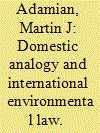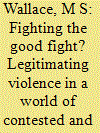| Srl | Item |
| 1 |
ID:
117030


|
|
|
|
|
| Publication |
2012.
|
| Summary/Abstract |
Increasingly, international law is used to address a variety of issues that do not fit nicely within political boundaries. Therefore, we must remain critical of the use of international law to address issues such as climate change. In order to do so this article will look at the domestic analogy and how it has shaped our understanding and expectations of the use of international law. In several respects, the international system mirrors domestic society. Yet, there are very real and significant differences that hamper our ability to effectively use international law to address these issues. As global capitalism expands and reaches ever-further corners of the world, practical problems continue to escalate and repercussions become increasingly serious and irreversible. These practical problems carry with them equally important ethical issues. Perhaps international law as currently conceived and applied is incapable of adequately addressing such issues.
|
|
|
|
|
|
|
|
|
|
|
|
|
|
|
|
| 2 |
ID:
117031


|
|
|
|
|
| Publication |
2012.
|
| Summary/Abstract |
In a 2008 International Politics article, David Patrick Houghton questions the importance of 'The Third Debate' in IR theory between 'positivism and postmodernism' and the relative worth of contrasting epistemological positions. Houghton's main argument is that the philosophical underpinnings of IR have not been central to what IR scholars actually do; specifically, the epistemological differences between positivists and postmodernists have little practical effect upon their empirical findings. In short, epistemology does not matter. This article analyses Houghton's thesis within the context of a dominant discourse in the discipline that derides postpositivism and, by corollary, rejects methodological pluralism incorporating both positivist and postpositivist approaches, what I refer to as 'epistemethodological pluralism'. This article questions the main assumptions underpinning this discourse by deconstructing the definition of 'postpositivism' that underpins the 'naysayer' arguments deriding or dismissing epistemological differences between positivism and postpositivism. Using examples of positivist and postpositivist research that focus on the foreign policy of the United States, European Union integration and Middle East politics, the article demonstrates how epistemological issues have a significant impact on empirical research in International Relations and illustrates the benefits of integrating the different epistemological approaches.
|
|
|
|
|
|
|
|
|
|
|
|
|
|
|
|
| 3 |
ID:
117029


|
|
|
|
|
| Publication |
2012.
|
| Summary/Abstract |
Starting from violence's widely acknowledged status as a wrong, this article critically explores attempts to legitimate violence through appeals to moral frameworks that determine the ends for which violence may be employed. Recognizing that such frameworks exist on all sides of violent conflict, it argues that since there will never be complete agreement on their content or application, nor complete certainty about which moral framework is the 'correct' one, it becomes impossible to distinguish legitimate from illegitimate violence either non-controversially or with certainity. Two problems result: our own 'legitimate' violence may reproduce rather than limit violence by sparking 'legitimate' violence in return, and our own use of violence may actually be unjust, despite our intentions. If we wish to avoid these problems yet maintain our moral commitments - however contested or contingent - we must employ nonviolent means to wage our conflicts, as such means remain legitimate despite disagreement or uncertainty regarding ends.
|
|
|
|
|
|
|
|
|
|
|
|
|
|
|
|
| 4 |
ID:
117028


|
|
|
|
|
| Publication |
2012.
|
| Summary/Abstract |
This article argues that an engagement with the political philosophy of Leo Strauss is of considerable value in International Relations (IR), in relation to the study of both recent US foreign policy and contemporary IR theory. The question of Straussian activities within and close to the foreign policy-making establishment in the United States during the period leading up to the 2003 invasion of Iraq has been the focus of significant scholarly and popular attention in recent years. This article makes the case that several individuals influenced by Strauss exercised considerable influence in the fields of intelligence production, the media and think tanks, and traces the ways in which elements of Strauss' thought are discernible in their interventions in these spheres. It further argues that Strauss' political philosophy is of broader significance for IR insofar as it can be read as a securitising response to the dangers he associated with the foundationlessness of the modern condition. The article demonstrates that the politics of this response are of crucial importance for contemporary debates between traditional and critical IR theorists.
|
|
|
|
|
|
|
|
|
|
|
|
|
|
|
|